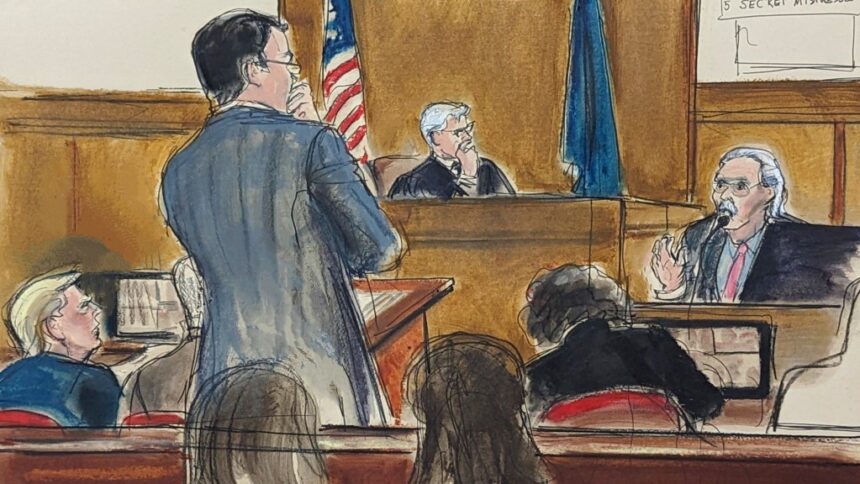
Last Tuesday, I set my alarm for 4:30 a.m., left home at 5 a.m., and arrived at the Manhattan Criminal Courthouse by 5:30 a.m. In my youth, I lined up for more than my share of Springsteen and other concerts so I figured I’d try my chances of getting into the Donald Trump trial.
When I arrived, there were already around 30 reporters queued up on the sidewalk across Centre St., a line that quickly grew. By 8 a.m., we moved into one of three lines for reserved media (the VIP pass), other reporters from around the world, and the general public.
Finally at 9 a.m., a court officer, whom seasoned trial attendees referred to as the maître d’, came out with passes for all the reporters and a mere six passes for the public. Despite an internet executive arriving late and jumping to the front of the unsupervised line, I got one of the coveted tickets, gaining me a last row seat in the actual courtroom.
The trial was fascinating. While many dedicated journalists are doing an admirable job relaying trial highlights, reading second-hand accounts and hearing talking heads discuss the day’s events is nothing like witnessing it in person. It’s the difference between hearing “Thunder Road” live and solely reading the lyrics to see how effectively testimony sways the jury.
The day started with a hearing on the prosecution’s request to find Trump in violation of the gag order. No report I have seen adequately conveyed Judge Juan Merchan’s no-nonsense frustration with Trump attorney Todd Blanche’s bumbling attempts at justifying Trump’s social media posts. A fellow public attendee — a retired California judge with decades of courtroom experience — described Blanche’s performance to me, “I’ve never seen a lawyer crash and burn like that.”
Following the gag order hearing, the jury entered and the trial’s second day commenced. Defendant Trump, slightly hunched over his 77-year-old frame, lumbered in through the courtroom’s back door and walked with his entourage right past us to the defendant’s table.
All rose for the judge and shortly afterwards David Pecker, former publisher of the National Enquirer, testified about his long friendship with Trump, and the Enquirer’s support of his 2016 campaign. Pecker spoke in great detail about running stories attacking Trump’s rivals — first Ben Carson, Ted Cruz, and Marco Rubio, and then Hillary Clinton. He then described his efforts to prevent unfavorable stories about Trump from seeing the light of day.
The irony didn’t escape me that the court officer announced the case as “THE PEOPLE OF THE STATE OF NEW YORK against DONALD J. TRUMP,” even though nearly all “people” are prevented from attending the trial happening in our name.
While I was extremely fortunate to attend in person, it shouldn’t be this way. New York Judiciary Law states, “The sittings of every court within this state shall be public, and every citizen may freely attend the same.” This is clearly not the case.
It’s astonishing that this historic trial is not taking place in public, but nearly in secret.
According to a Fund for Modern Courts report, New York is one of two states (along with Louisiana) that have the most-restrictive rules governing audiovisual coverage of courtroom proceedings. Allowing in six people to a trial in a city of more than 8 million does not make it public.
Unlike at a Springsteen show, we were warned that use of phones in the courtroom was strictly forbidden. There was an overflow room with closed circuit TV that allowed more reporters to attend, but at most a handful of other civilians. It amazes me that the only records of one of the most consequential trials in American history are transcripts and sketch artists’ drawings, with no audio or video record.
This needs to change immediately, ideally in time for the public to see the remainder of the trial. State Sen. Brad Hoylman-Sigal, a great advocate for government transparency, has sponsored a bill that has passed the Senate but not the Assembly. He told me that “New York should be a leader in government transparency, and that includes letting cameras into our courtrooms. Keeping citizens from being able to attend, and view, one of the most important trials in our country’s history is a disservice to our citizens and to our democracy.”
The Assembly must pass his bill, and Gov. Hochul should sign it at once.
In the meantime, in order to comply with the Judiciary Law, the court should open many more overflow rooms to ensure that, as state law requires, every citizen can freely attend the trial.
Robbins owns Upper West Strategies, a NYC-based small business that runs internship programs.

